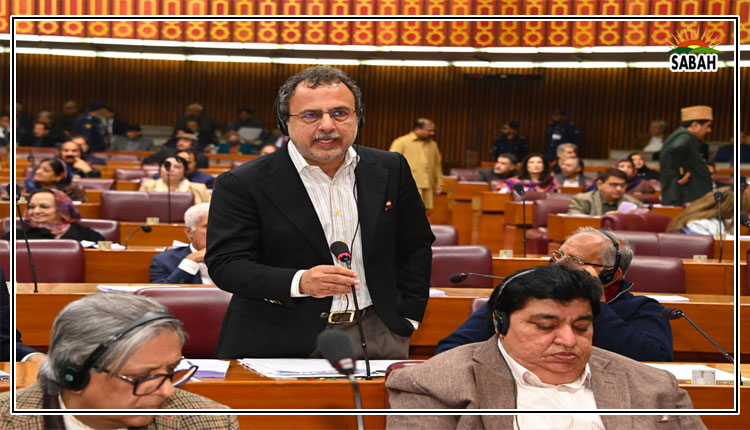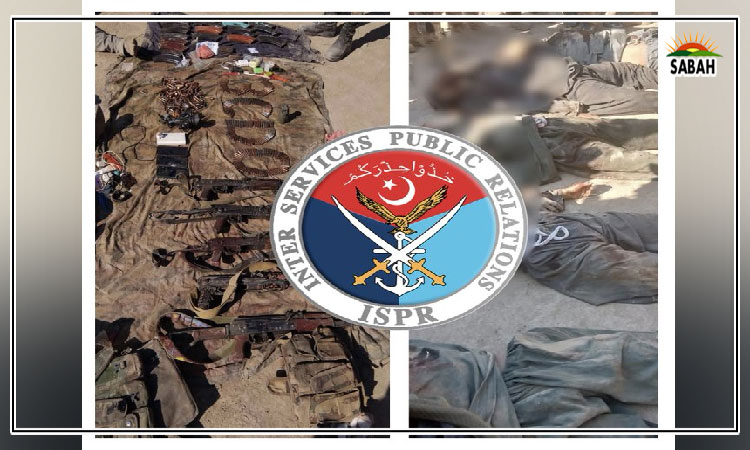IHC Justice Tariq Mehmood Jahangiri suspends FIRs filed against Sheikh Rashid Ahmed in Karachi, Lasbela
ISLAMABAD, Feb 06 (SABAH): The Islamabad High Court (IHC) on Monday suspended the first information reports (FIRs) registered against Awami Muslim League (AML) Chief and former interior minister Sheikh Rashid Ahmed in Mochko Police Station Karachi and Lasbela district of Balochistan.
Justice Tariq Mehmood Jahangiri heard Sheikh Rashid’s petition to stop his transfer to Karachi and to hold contempt of court proceedings against the police.
The AML chief’s lawyer argued that although the court had restrained further action on the summons of the Aabpara police station, the police registered a case and made an arrest on the same application.
The lawyer said another FIR against Sheikh Rashid was registered in Mochko police station, Karachi. The court inquired how the case was registered in the port city when the statement was given in Islamabad’s Polyclinic Hospital.
The court restrained the police from acting on the FIRs registered against Sheikh Rashid in Mochko police station, Karachi and Lasbela, Balochistan.
Further, the IHC issued notices to the attorney general, advocate general and bar councils suspending the FIRs registered against the ex-minister in Mochko police station, Karachi and Lasbela.
During the hearing, the court questioned how there can be FIRs registered in different cities on the same incident. The lawyer said that a third FIR was also registered in Murree.
When asked whether an arrest has been made in these three cases, the lawyer said that Sheikh Rashid was arrested in one case.
Justice Jahangiri remarked that according to the law when an arrest is made on one case, it is also made on the rest.
The lawyer also told the court that under physical remand, Rashid had been tied to a chair at an unknown location where he was kept for six hours. During this time, the AML chief’s counsel said that Rashid was asked political questions and subjected to violence.
The judge questioned where “this series will stop” and reminded the counsel that “you had filed terrorism cases against the information secretary and the PTV MD and now the same thing is happening against you”. “Imagine what would have happened if the police had arrested the female information secretary,” he added. The case was then adjourned till February 9.
Meanwhile, a district and sessions court in Islamabad Monday adjourned the hearing of Sheikh Rashid’s post-arrest bail plea till today (Tuesday).
Once the hearing resumed at 12:30 PM, the prosecutor told the court that the investigation officer — who had gone to the high court with the case record — had not returned.
During the proceedings, the petitioner’s counsel also sought two days’ time for the preparation of the case. After hearing this, Judge Umar Shabbir adjourned the hearing till today (Tuesday). The AML chief is currently in Adiala Jail on judicial remand for 14 days.
Initially, Sheikh Rashid, according to the police, was arrested in the case of leveling allegations against Zardari. Just a day later, Muree Police also registered a case against him.
The FIR was lodged at the complaint of investigation officer Ashiq Ali, from the Aabpara police station, Islamabad. Rashid threatened the police personnel and stated that he would not spare them, according to the FIR.
The FIR was registered under Section 154 of the Criminal Procedure Code of Pakistan, charging Rashid with interfering in official affairs and resisting his arrest. The FIR states that the former minister physically pushed and abused the police officers and threatened them with serious consequences at gunpoint.
Besides the former minister, his two employees have also been implicated in the case.
The FIR stated that when the police arrived at Rashid’s residence, he came out with his armed servants and resisted police efforts while threatening them. The minister was told that he was booked under three sections of the Pakistan Penal Code — 120B (criminal conspiracy), 153A (promoting enmity between different groups), and 505 (statements conducing to public mischief), read the FIR.
After that, he started resisting and interfering in the official affairs of the police, while threatening them with serious consequences at gunpoint.
Abusing the policemen, Rashid said he had been a minister several times and that he would not spare them, read the FIR. Hence, he committed an offence under Section 506ii (threatening to cause death or grievous hurt], 353 [Assault or criminal force to deter public servant from discharge of his duty] and 186 [Obstructing public servant in discharge of public functions].
An FIR has also been registered against Sheikh Rashid for using “filthy” language against Foreign Minister Bilawal Bhutto at the Mochko Police Station in Karachi. The case was filed under four sections of the PPC — including 500 (Punishment for defamation), 506 (punishment for criminal intimidation), 504 (intentional insult with intent to provoke breach of the peace) and 153-A (promoting enmity between different groups).
According to the FIR, the AML chief used “highly offensive and disgusting” words against party chairman Bilawal during a media talk at the Polyclinic Hospital which led to anarchy among thousands of PPP workers.
“A large number of people took to the streets and I, along with other members including Pir Buksh, son of Ali Murad, Muhammad Bux, son of Mola Buksh, and others, tried hard to stop them,” added the FIR.
It also said that the AML chief deliberately conspired to subvert peace, tried to instigate conflict and bloodshed and attempted to spread disorder.
“Legal action should be taken against him (Sheikh Rashid),” it said.
In a similar case filed in Lasbela, Balochistan, Sheikh Rashid was booked for using “filthy” language against Bilawal. The FIR includes five sections of the PPC, including 500 (punishment for defamation), 506 (punishment for criminal intimidation), 504 (intentional insult with intent to provoke breach of peace), 153-A (promoting enmity between different groups), and 186 (obstructing public servant in discharge of public functions).












